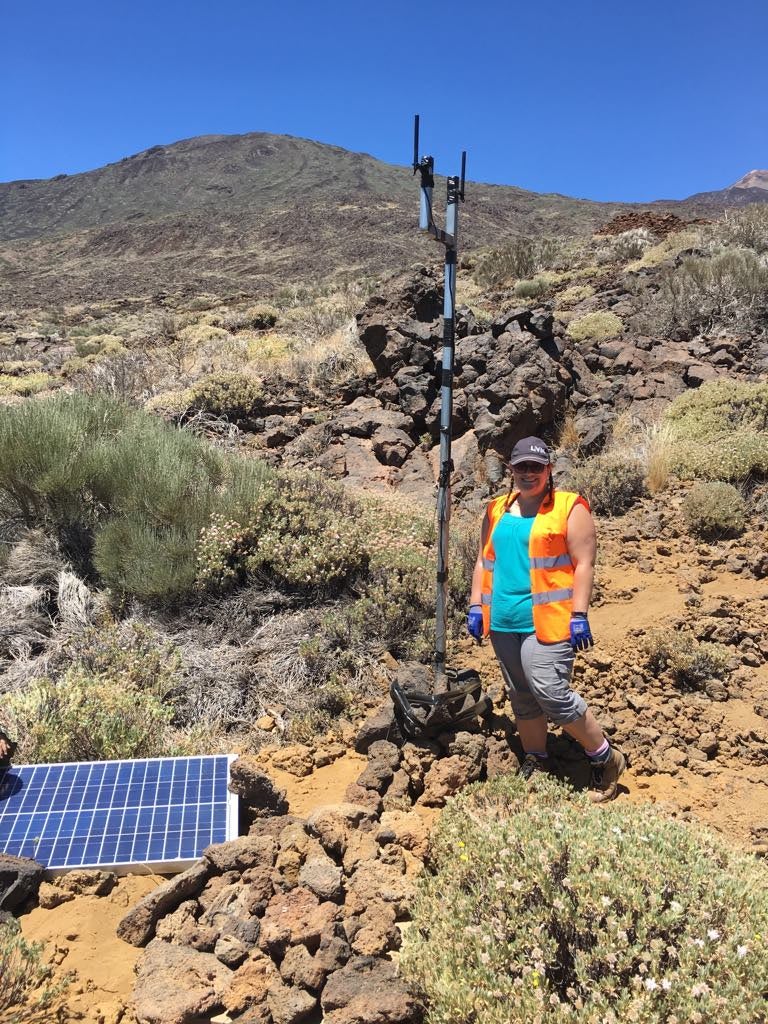
Watching the earth move
The last thing Brittany Russo (BASc in progress) thought she was going to do was seismically monitor a volcano

The last thing Brittany Russo (BASc in progress) thought she was going to do was seismically monitor a volcano
By Brittany Russo (BASc in progress) StudentWhenever the choice for a new opportunity crops up, I always ask which option scares me most. And that's the one I choose. This has been the fundamental question I ask myself every term when choosing a co-op job, and it has led me to my most recent position as a seismology intern in Europe.

I was given the opportunity to travel to the Canary Islands in Spain for one month with a program called GeoIntern, run by GeoTenerife in association with Involcan (the Canary Islands Volcanology Institute).
Thanks to my program, Volcano and Geothermal Seismic Research, I learnt about volcanic-tectonics, better understood as earthquakes caused by volcanic activity. I was in charge of seismic monitoring of the active volcano, Mount Teide, the highest peak in Spain.
My main role at Involcan was to locate the hypocenter of earthquakes and their magnitudes. Using this information, Involcan produces a bulletin every week about the seismic activity of the volcano, along with the geothermal activity and temperature.

This information is important to the public and government since Teide is an active volcano. The information that I gathered on a daily basis is monitored to make sure there are no anomalies. If anomalies are found, then Involcan can notify the correct government agencies to set emergency procedures in motion to ensure the least number of casualties and destruction in case of an eruption.
I was also given the opportunity to check out three of the 17 seismograph stations surrounding Tenerife, the largest island in the Canary Islands Archipelago. We were tasked with installing, fixing, and uninstalling seismometers on the base of Pico Viejo, the twin peak to Mt. Teide. The stations rely on a Wi-Fi signal to send data back to the Involcan servers, allowing us to access the data in the office. It was always a struggle trying to find a suitable Wi-Fi signal at the top of an isolated volcano.
The above video is of a climber who visited the volcano.
These seismic stations are the basis behind the seismic monitoring of Mt. Teide. Without them, the seismologists cannot have real-time data about the earthquakes happening around the islands. Having real-time data is important to spot anomalies as they happen.
Co-op at the University of Waterloo is not solely about working and making money. I firmly believe that it is about exploring your passions and forming a roadmap to your ideal career after you graduate
Even though I did not get paid for working in Spain, I gained invaluable experience that will further my career in seismology and geophysics. Co-op at the University of Waterloo is not solely about working and making money. I firmly believe that it is about exploring your passions and forming a roadmap to your ideal career after you graduate. Find the opportunities as I did, like with my Spain trip, and it will surely benefit you in the end.

Read more
Waterloo co-op student applies engineering and tech skills at Caivan to support purpose-built housing and build land-development expertise

Read more
How Doug Kavanagh’s software engineering degree laid the foundation for a thriving career in patient care

Read more
Redefining capstone learning by bringing students, faculty and community partners together to tackle real-world challenges
The University of Waterloo acknowledges that much of our work takes place on the traditional territory of the Neutral, Anishinaabeg, and Haudenosaunee peoples. Our main campus is situated on the Haldimand Tract, the land granted to the Six Nations that includes six miles on each side of the Grand River. Our active work toward reconciliation takes place across our campuses through research, learning, teaching, and community building, and is co-ordinated within the Office of Indigenous Relations.